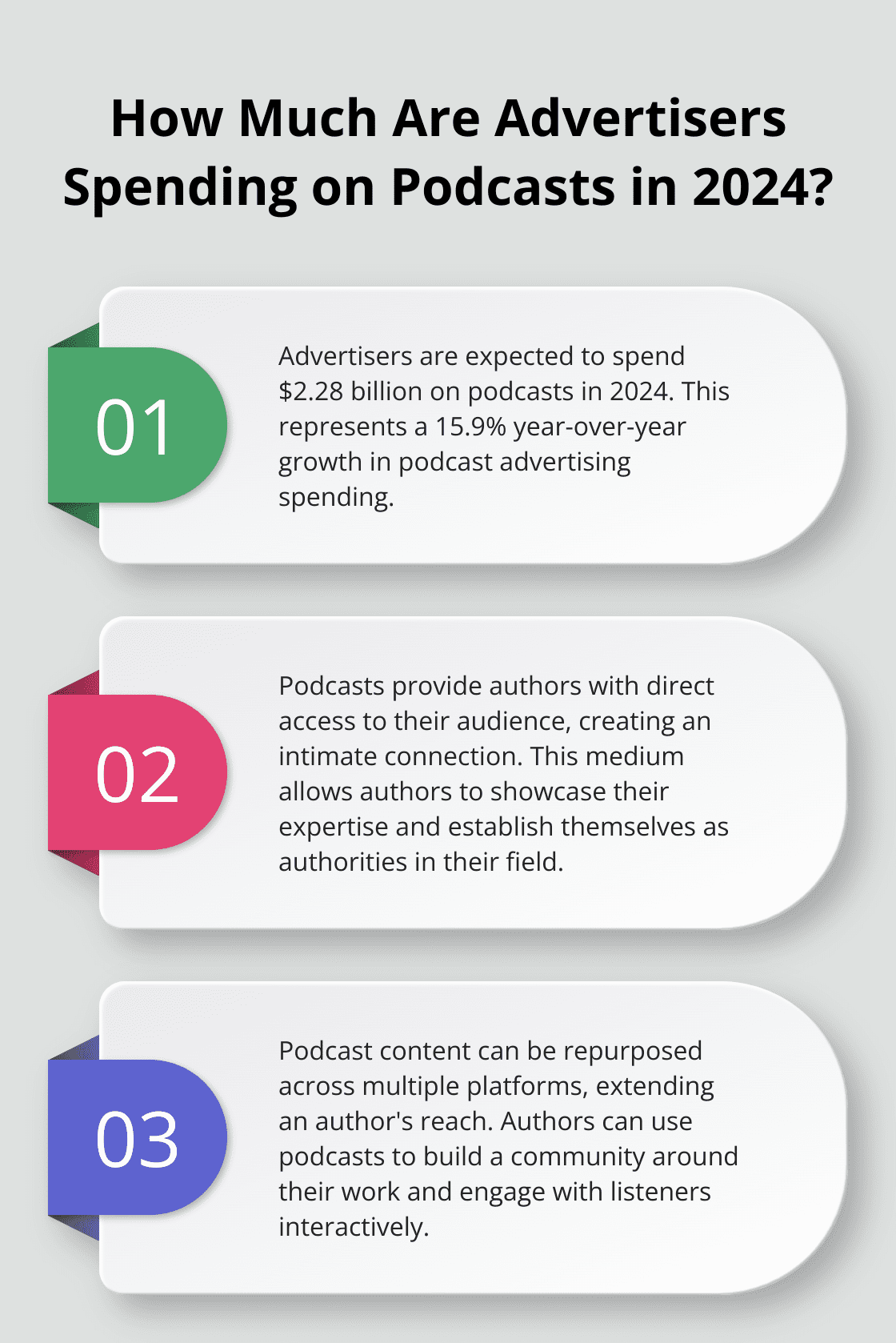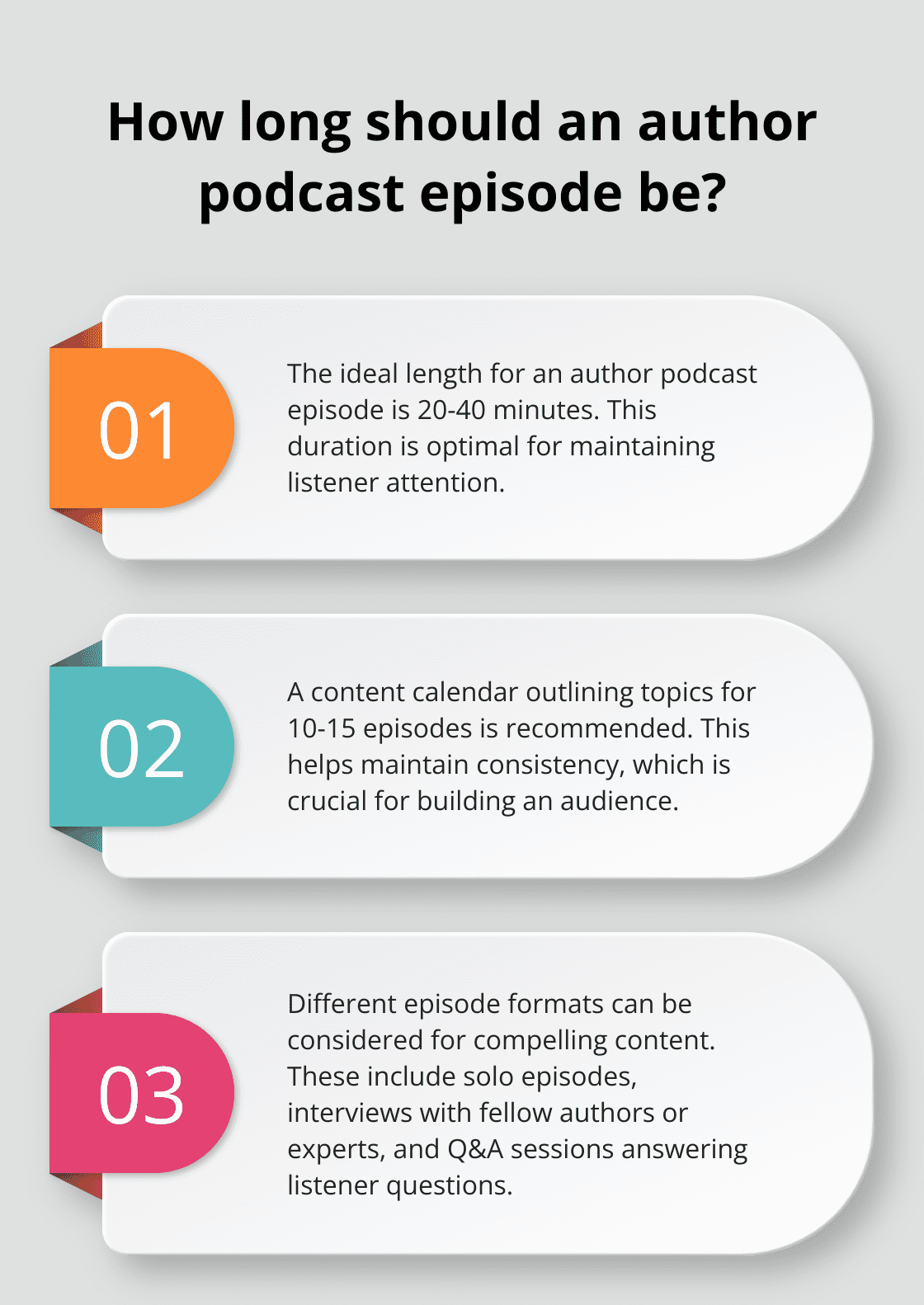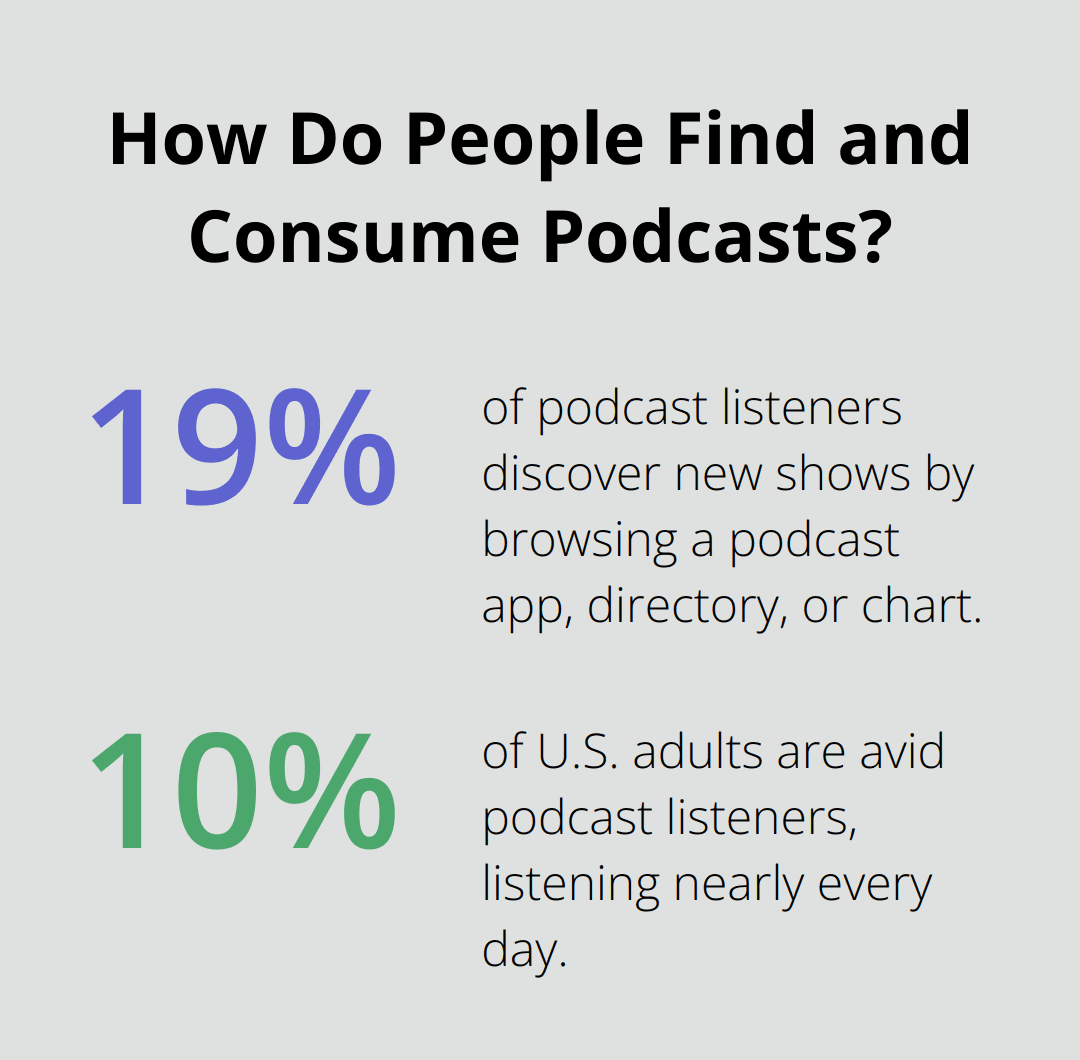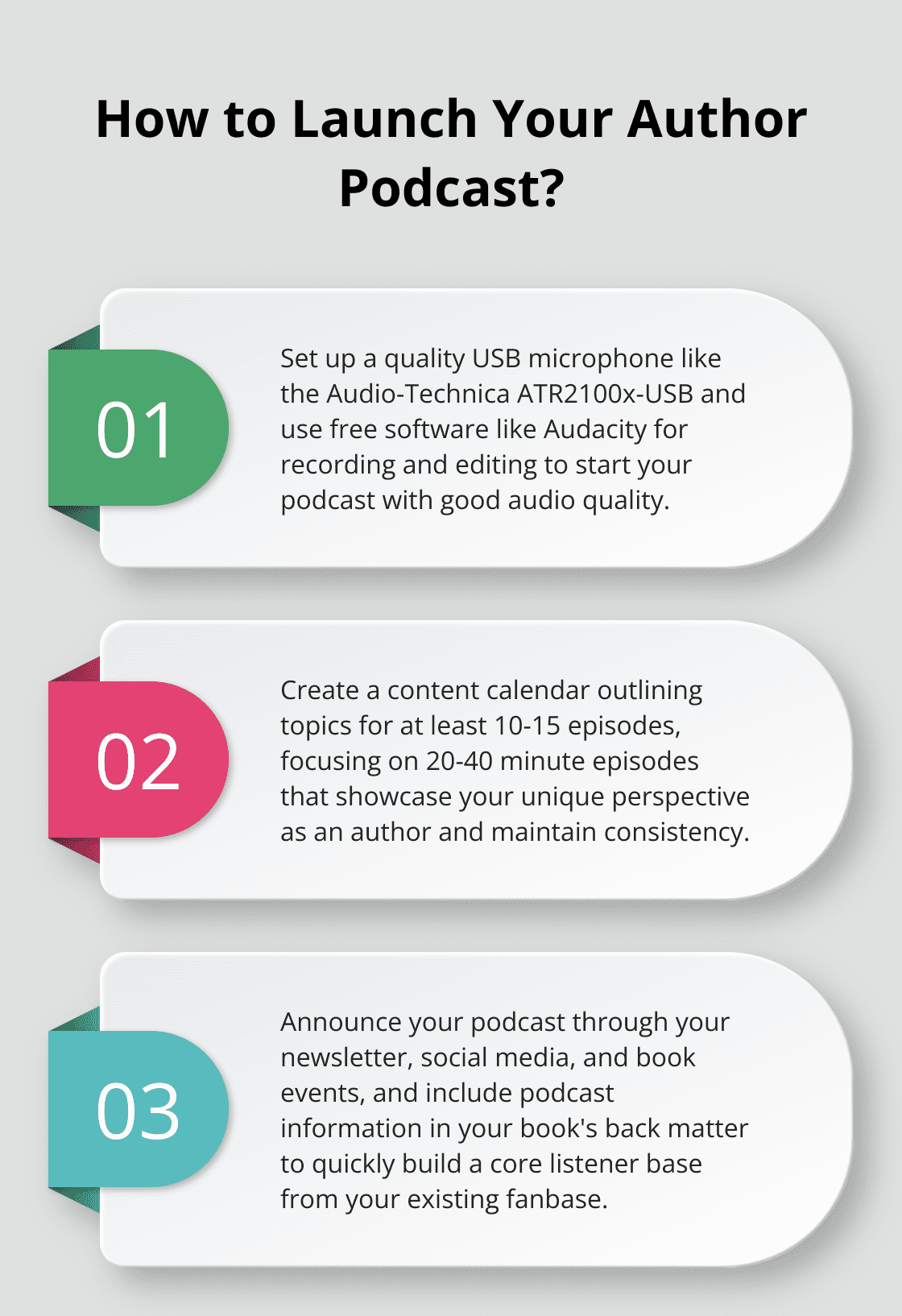At Beverly Hills Publishing, we’ve seen firsthand how podcasting can transform an author’s career. Author podcasting benefits extend far beyond book sales, offering a unique platform to connect with readers and establish authority in your niche.
In this post, we’ll explore the power of author podcasts and provide practical steps to launch your own show. We’ll also share effective strategies to grow your audience and maximize the impact of your podcast.
Why Podcasts Are a Game-Changer for Authors
Direct Access to Your Audience
Podcasts provide authors with a direct line to their readers’ ears. Unlike social media or blog posts, podcasts create an intimate connection. Your voice, personality, and passion shine through, helping listeners feel a personal connection. This bond builds trust and loyalty, transforming casual readers into devoted fans.
Showcase Your Expertise
Podcasts offer an excellent platform to demonstrate your knowledge and authority. When you discuss topics related to your books, you position yourself as an expert in your field. This increased credibility can lead to more book sales, speaking engagements, and other opportunities.

A historical fiction author, for example, could start a podcast discussing the real-life events that inspired their novels. This approach not only promotes their books but also establishes them as a knowledgeable source on historical topics.
Content Repurposing Goldmine
Your podcast episodes serve as a treasure trove of content that you can repurpose across multiple platforms. Here are some ways to maximize your podcast content:
- Transcribe episodes and convert them into blog posts or articles.
- Extract key quotes for social media posts.
- Use episode discussions as inspiration for newsletter content.
- Create short video clips for platforms like TikTok or Instagram (perfect for reaching younger audiences).
This multi-platform approach extends your reach and reinforces your message across different mediums.
Build a Community Around Your Work
Podcasts foster a sense of community among listeners. You can engage with your audience by answering their questions, featuring listener stories, or hosting live episodes. This interaction creates a loyal fan base that’s more likely to support your future projects.
A mystery author could involve listeners in solving fictional cases, creating an interactive experience that keeps fans engaged between book releases.
Expand Your Reach and Influence
Podcasting offers authors a unique opportunity to expand their reach, showcase their expertise, and create a deeper connection with their audience. As the podcast industry continues to grow, authors who embrace this medium will have a significant advantage in building their brand and growing their readership. According to a March 2024 forecast, advertisers are expected to spend $2.28 billion on podcasts in 2024, marking a 15.9% year-over-year growth.
Now that we’ve explored the benefits of podcasting for authors, let’s dive into the practical steps you need to take to launch your own show. In the next section, we’ll cover everything from defining your podcast’s niche to choosing the right equipment.
How to Launch Your Author Podcast
Finding Your Unique Voice
Your podcast should reflect your distinct perspective as an author. Consider what sets you apart in your genre. Are you a mystery writer with a background in forensics? A romance novelist with a degree in psychology? Use these unique aspects to shape your podcast’s theme.

A sci-fi author might create a show that discusses the real science behind popular sci-fi concepts. This approach showcases expertise and attracts listeners interested in both science and fiction.
Choosing the Right Equipment
You don’t need a professional studio to start podcasting, but good audio quality is essential. Invest in a quality USB microphone like the Audio-Technica ATR2100x-USB. This microphone offers excellent sound quality without breaking the bank.
For recording and editing, free software like Audacity can get you started. As you grow, you might consider upgrading to more robust options (like Adobe Audition or Hindenburg Journalist).
Creating Compelling Content
Plan your episodes carefully. Start with a content calendar that outlines topics for at least 10-15 episodes. This helps maintain consistency, which is key to building an audience.
Consider different episode formats:
- Solo episodes where you share insights about your writing process or industry trends.
- Interviews with fellow authors or experts in fields related to your books.
- Q&A sessions answering listener questions about your work or the writing process.
Keep your episodes focused and engaging. Try to create episodes that last 20-40 minutes, which is ideal for maintaining listener attention.
Selecting a Hosting Platform
Your podcast needs a home on the internet. Popular hosting platforms include Libsyn, Buzzsprout, and Podbean. These services not only store your audio files but also distribute your podcast to major listening platforms (like Apple Podcasts and Spotify).
When choosing a host, consider factors like storage limits, analytics tools, and ease of use. Some platforms offer additional features like website creation or monetization options, which might be valuable as your podcast grows.
Launching a podcast takes effort, but it’s a powerful way to connect with your readers and expand your author platform. With the right approach, your podcast can become a valuable asset in your author toolkit. In the next section, we’ll explore effective strategies to grow your podcast audience and maximize its impact.
How to Skyrocket Your Podcast Audience
Tap into Your Existing Fanbase
Your current readers form your best initial audience. Announce your podcast through your newsletter, social media, and at book events. Include podcast information in your book’s back matter or author bio. This cross-promotion will quickly build a core listener base.
Collaborate for Exponential Growth
Partnerships with other authors or industry experts can dramatically expand your reach. Guest appearances on established podcasts in your genre will introduce you to new audiences. 19% of podcast listeners discover new shows by browsing a podcast app, directory, or chart.

When you host guests on your show, ask them to share the episode with their audience. This reciprocal promotion can lead to significant growth. A romance author who interviews a relationship therapist, for example, taps into both literary and psychological interest groups.
Harness the Power of Social Media
Social media platforms play a crucial role in podcast promotion. Create shareable content from your episodes, such as quote images or short audio clips. These bite-sized teasers will pique interest and drive traffic to your full episodes.
TikTok has become a powerhouse for podcast promotion. The platform’s short-form video format suits sharing engaging snippets from your episodes perfectly.
Optimize for Search and Discovery
Make your podcast easily discoverable. Use relevant keywords in your show title, episode titles, and descriptions. This SEO approach helps your podcast appear in search results on platforms like Apple Podcasts and Spotify.
Consider creating a dedicated website for your podcast. This not only improves discoverability but also provides a central hub for all your podcast content. Include transcripts of your episodes to boost SEO and make your content accessible to a wider audience.
Engage and Encourage Action
Listener engagement is key to growing your audience. Encourage listeners to subscribe, rate, and review your podcast. Positive reviews and high ratings improve your podcast’s visibility on major platforms.
Create a call-to-action in each episode, asking listeners to share the episode if they enjoyed it. Word-of-mouth remains one of the most powerful marketing tools. 10% of U.S. adults are avid podcast listeners, listening nearly every day.
Implement these strategies consistently, and you’ll see your podcast audience grow steadily over time. Building a successful podcast requires patience and persistence (it’s a marathon, not a sprint). Focus on creating valuable content for your listeners, and the growth will follow.
Final Thoughts
Podcasting empowers authors to connect with their audience, showcase expertise, and expand their reach. The intimacy of audio forges deeper connections with listeners, transforming casual readers into devoted fans. Authors can repurpose podcast content across multiple platforms, creating a robust content strategy that reinforces their brand and message.

Consistency and quality determine podcasting success. Regular episodes build anticipation and loyalty among listeners, while high-quality content keeps them engaged. The benefits of author podcasting extend beyond book sales, opening doors to opportunities that can significantly enhance an author’s career.
We at Beverly Hills Publishing understand the transformative power of podcasting for authors. Our integrated approach to publishing and brand building helps authors leverage podcasting alongside other strategic tools to elevate their visibility. Starting a podcast may seem daunting, but the potential rewards far outweigh the initial challenges (your audience is waiting to hear your voice).















































































































































































































































